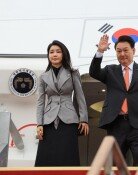Has Korea Lost Its Way?
Trains heading for different destinations are moving quicker than expected. If they start their engines slowly, passengers can decide which ones to take after finding out where they are heading for. But if they leave right away, passengers who did not decide where to go will be at a loss, said an expert from a Washington-based think tank on Thursday, drawing an analogy to describe Koreas current situation regarding the changing Asia-Pacific security landscape.
As so-called maritime vs. continental competing forces have been formed in a short period of time, Korea has to make a difficult decision. While the United States, Japan and Australia are forming a security cooperation network, China, Russia and Central Asia are strengthening their military cooperation ties as well.
Critics point out that if South Korea thinks within the framework of the balancer Northeast Asia promoted by South Koreas president Roh Moo-hyun in March 2005, it will be unable to respond actively to the changing situation.
Maritime vs. continental forces-
U.S. president George W. Bush, a big fan of biking, rode a bike on Thursday when he visited Sydney to attend the Asia Pacific Economic Cooperation (APEC) Summit. Australian Prime Minister John Howard rode a bike with him side by side. The two heads of state enjoyed a cruise in the port of Sydney and had dinner together.
While they showed their special friendship all day long, President Bush promised that the U.S. would provide cutting-edge weapons technology to Australia. In response, Prime Minister Howard proposed that Australia would offer supply bases for rescue aid and human resources in the Asian region to the U.S.
On Saturday, Japanese Prime Minister Shinzo Abe will attend his nations first three-way security talks. They are expected to talk about how to solidify security relations with each other. The Japanese government will propose to hold the three-way talks regularly.
Along with India and Singapore, the three countries have begun a joint naval exercise in the Indian Ocean since Tuesday. This is the largest-ever scale exercise in the region, including three airplane carriers, 25 warships, and 100 fighters.
In response to the move, China and Russia began a joint military exercise with four Central Asian countries at the Ural Mountains, Russia from August 9 through 17, 2007.
Where is Korea?
Several diplomatic sources said on Thursday, During the preparation for the joint naval exercise, the U.S. and Japan did not ask Korea about participation. They also added that in the process of forming their three-way security alliance, they did not ask Korea to join.
The official purpose of the naval exercise is to stop the activities of pirate ships and block access to weapons of mass destruction in the Strait of Malacca, which accounts for 30 percent of world trade, and one quarter of the worlds oil trade. Experts say that Korea had a reason to join the exercise because its economy is heavily dependent on safety in the Malacca Straits.
A Korean government official said, (The absence of a request to join the alliance) is not because Koreas relations with the U.S. and Japan are strained, but because solidifying the three-way alliance is the most important task at the moment. So they are not considering drawing in other countries such as Korea or Canada.
Another official said that South Koreas basic stance is to wait and see.
Within the Korean government, many people believe that the U.S. is the only solution to the survival of Korea, considering Chinas undemocratic nature and its historical track record of serving as a regional superpower. However, it is not easy to express such an opinion publicly.
This is largely because South Korean President Rohs balancer of Northeast Asia theory is still taking hold. Some people strongly argue that joining the security alliance against China does not bring any real benefit to Korea.
Peter Brooks, Senior Fellow at the Heritage Foundation, said on his report on Thursday that since Chinas moves are totally unpredictable, it is quite natural for other democratic countries to create a new security order by cooperating on a variety of issues ranging from politics to economy and security.
Aside from the question of its righteousness, the point is that the realignment of the security alliances in the region is proceeding much faster than expectations.
A Korean government official said, Until the beginning of this year, we expected that fortifying the three-way alliance would take some time and that Indias involvement would be very low. We thought we could just welcome the move, but things are changing rapidly.
sechepa@donga.com srkim@donga.com







